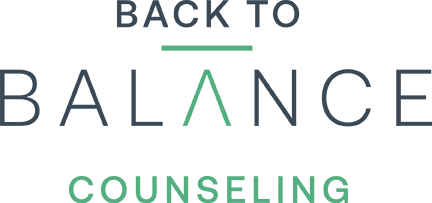Eating Disorder Treatment
Understanding Eating Disorders
Eating disorders are tough. They affect all different types of people, and can feel overwhelming and isolating. Whether you’re dealing with the restrictive patterns of anorexia nervosa, the cycle of binging and purging in bulimia, or the fear of food that comes with Avoidant/Restrictive Food Intake Disorder (ARFID), it’s important to remember that you do not need to suffer in isolation. These struggles often stem from deeper issues with body image, self-worth, and control. But the good news is that with the right support, healing and recovery is possible. At Back to Balance Counseling, we’re here to help you, offering compassionate care and a path toward a healthier relationship with your body and mind.

Anorexia Nervosa
Anorexia nervosa often involves an intense fear of gaining weight and a distorted view of one’s body, leading to extreme food restriction or other unhelpful eating habits in an effort to help cope with anxiety, stress, or poor self-esteem. It’s common for those with anorexia to feel that their value is tied to how well they can control their bodies and keep their weight down. This can lead to serious health issues, like malnutrition and social withdrawal, and it’s not something you should have to face alone.
Our team is here to support you, starting with getting your health back on track, but also going beyond that. Through Cognitive Behavior Therapy (CBT) and exposure therapy, we help you work through those tough thoughts and beliefs about food and your body. We believe in helping you see your body as an ally, not an enemy, and guiding you toward self-compassion and a renewed sense of control that doesn’t come from restriction but from a place of trust and care.
Bulimia Nervosa
Bulimia nervosa is characterized by cycles of binge eating followed by purging, which can involve vomiting, excessive exercise, or other methods to “undo” the eating. This cycle is often driven by feelings of shame and a desperate need to control weight. It’s exhausting, both physically and emotionally, and it can feel like you’re stuck in an endless loop.
We work with you to break the binge-purge cycle through CBT, helping you understand and change the thoughts and emotions that trigger these behaviors. Exposure therapy can also be a powerful tool, allowing you to face your fears around food and eating in a safe and supportive way. Most importantly, we focus on helping you build a kinder relationship with your body, replacing self-criticism with self-compassion.

ARFID: Overcoming the Fear of Food
Avoidant/Restrictive Food Intake Disorder (ARFID) involves extreme avoidance of certain foods, often due to sensory sensitivities, fear of choking, or a general lack of interest in eating. Unlike anorexia or bulimia, ARFID isn’t about body image or weight, but it can still lead to serious nutritional issues and social isolation.
We take a gentle, supportive approach to reintroducing foods that may feel scary to you. Through a combination of cognitive behavior therapy, exposure to fear foods, and relaxation training, we’ll work with you to gradually ease those fears and build a more positive relationship with food. We know trust is essential in this process, and we’re committed to creating a trusted space where you can explore these challenges. We believe in your ability to overcome this, and we’re here to support you every step of the way.
Body Image Distress and Body Hatred
Struggling with body image distress or even outright body hatred is incredibly common among people with eating disorders. These feelings often come from societal pressures, past trauma, or negative experiences related to your body. It’s easy to start blaming your body for the pain you’re feeling, which can lead to a cycle of self-loathing and harmful behaviors.
We know how painful it can be to live with these feelings, and we want to help you challenge the harmful beliefs that may be fueling them. Through cognitive restructuring, exposure therapy, and self-compassion exercises, we’ll work with you to build a more positive, accepting view of your body. You deserve to feel good about yourself, and we’re here to help you get there.
Binge Eating and Restriction
Binge eating disorder (BED) involves eating large amounts of food in a short time, often accompanied by feelings of shame and a sense of losing control. Unlike bulimia, binge eating isn’t followed by purging, which can lead to weight gain and more body dissatisfaction. Restrictive eating, on the other hand, involves severely limiting food intake, often as a way to control weight or manage emotions. Both of these behaviors are complex and can feel overwhelming.
If you’re dealing with binge eating or restrictive behaviors, we want you to know that there’s hope. Our team can help you address the underlying emotions and triggers that drive these behaviors. We’ll focus on building self-compassion, helping you learn to treat yourself with kindness and understanding. Our goal is to help you develop a healthier relationship with food and your body, so you can live a life that feels balanced and fulfilling.
Moving Forward
Eating disorders are challenging, but recovery is within reach. At Back to Balance Counseling, we’re dedicated to providing the support and care you need to heal. Our approach is about more than just addressing the symptoms—it’s about helping you build a healthier, more compassionate relationship with your body and mind.
We’re here to help you every step of the way, offering personalized treatment that includes working through difficult thoughts, learning to trust your body, practicing self-compassion, and gradually facing your fears. We believe in your ability to move from a place of struggle and pain to one of acceptance and healing. With our support, you can reclaim your life and look forward to a brighter, healthier future.
You don’t have to go through this alone. There’s hope, and together, we can make recovery a reality.


